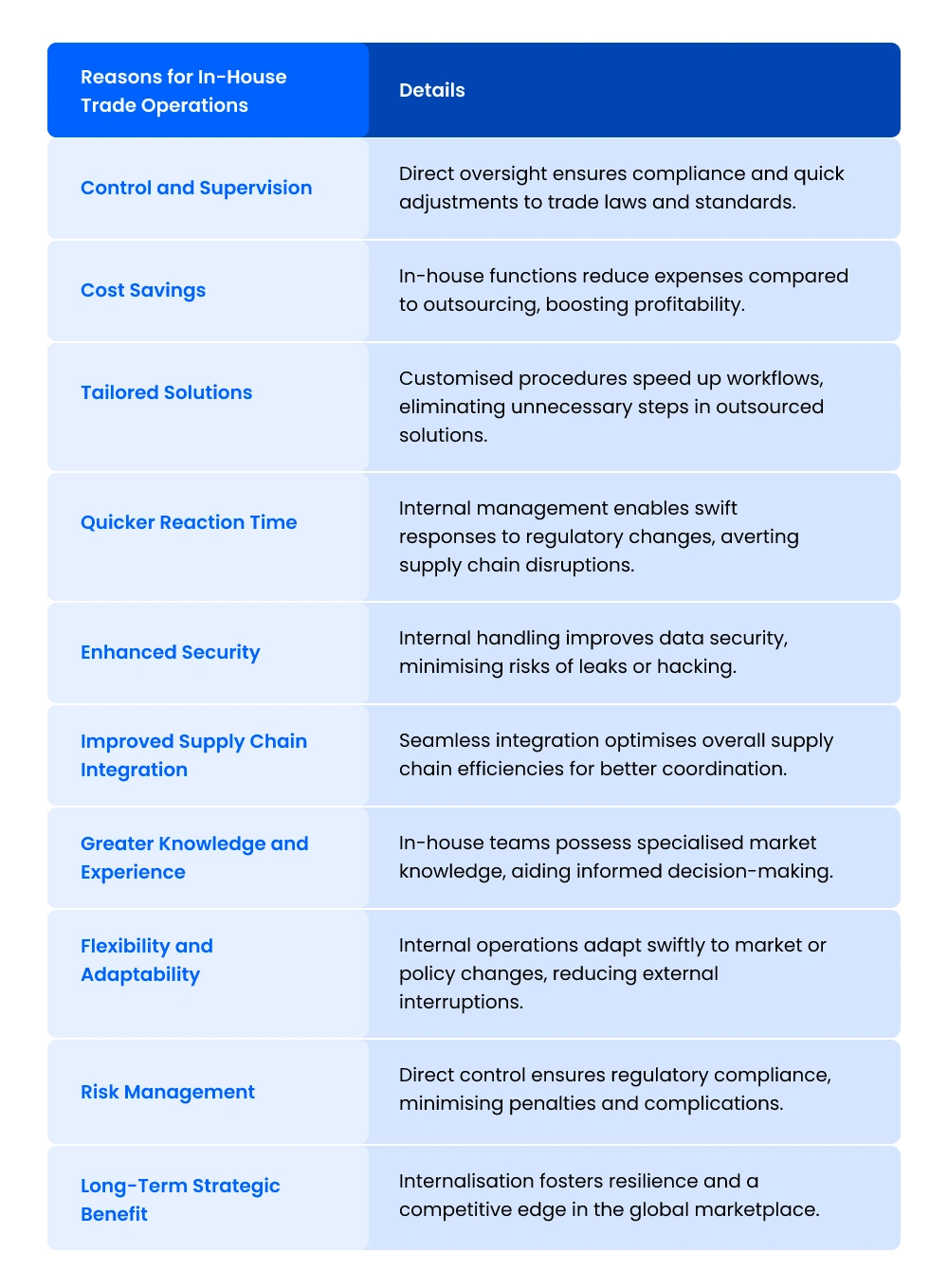Fast & Accurate ENS GB & EU ICS2 Solutions Built for You.
10 Reasons to Bring Customs Function In-House
-
Freya Jane
- Director of Customer's Success
International trade involves complex customs processes and regulations that can significantly impact the efficiency and cost-effectiveness of a trader’s operations. While some traders may choose to outsource their customs function to external service providers, there are compelling reasons why bringing the customs function in-house can be beneficial.
Traders involved in international trade often rely on customs brokers to navigate the complexities of customs clearance. However, customs issues can arise during this process, making it difficult to carry out.
Challenges of Custom Functions
As per the Federation of Small Businesses (FSB) report,
Small firms face customs function challenges of documentation (56%), logistics and supply chain issues (29%), and cost burden (49%).
Complex Regulatory Environment: Customs laws are complex and changeable, which necessitates custom services. It can be difficult to keep up with changes in trade agreements, tariffs, and compliance standards.
Resource-Intensive: Integrating customs procedures necessitates a significant investment of time, money, and skilled workers in addition to technology for continuous compliance checks.
Data management: To guarantee accuracy, security, and compliance with regulations, handling large amounts of data pertaining to exports, imports, and compliance calls for reliable systems.
Danger of Non-compliance: If customs laws are broken, there may be fines, penalties, or delays in the operation of the supply chain, which could have an effect on business continuity.
Global Trade Dynamics: With different laws and customs procedures in every country, managing customs operations gets more difficult in a global economy.
Technological Integration: It can be difficult and demands careful planning to integrate customs operations with current systems while also making sure they are compatible with emerging technologies.
Discover how iCustoms integrates seamlessly with your existing platform. Read out!
10 Reasons Why Traders Should Bring Trade inhouse

1. Control and Supervision
Supervision and control over customs operations are unparalleled when they are managed directly. It gives companies the ability to make sure that rules are followed and quickly adjust to changes in trade laws or industry standards.
2. Cost Savings
The possibility of cost savings is apparent when in-house custom functions are contrasted with outsourcing. Outsourcing entails extra expenditures like consulting fees, while in-house management can drastically cut these costs, which will ultimately result in increased profitability.
3. Tailored Solutions
Customisation of solutions is a powerful argument in favour of in-house customs functions. Customising procedures to perfectly meet the demands of the business accelerates workflows and removes superfluous steps that may occur in standardised outsourced solutions.
4. Quicker Reaction Time
There is no comparison to the agility obtained by internal management. Businesses are able to react quickly to changes in regulations, which helps to avoid delays or interruptions in their supply chains. Real-world examples highlight the need for short response times to preserve operational efficiency.
5. Enhanced Security and Confidentiality
Improved security and secrecy are guaranteed when sensitive information is managed internally. This enhances overall data security by lowering the possibility of data hacking or leaks that could happen with third parties involved.
6. Improved Supply Chain Integration
Seamless integration with other supply chain tasks is made possible by internalised customs operations. Through operation optimisation, this integration improves efficiencies and facilitates more seamless coordination, leading to supply chain innovation.
7. Greater Depth of Knowledge and Experience
The in-house teams have specialised knowledge about the markets, products, and regulatory landscapes of the business, which helps the companies make well-informed decisions regarding customs.
8. Flexibility and Adaptability
Internal customs operations provide unmatched flexibility in reacting to changes in the market or policy. This adaptability makes it possible for companies to quickly modify their plans and procedures, reducing interruptions from outside sources.
9. Observance and Management of Risk
Direct control ensures that regulatory standards are met, lowering the chance of penalties or legal complications. With internalised customs processes, it’s easier to reduce the risks that come with tariffs, duties, and trade barriers.
10. Prolonged Strategic Benefit
Companies can develop internal resources by internalising customs functions, which promotes resilience and independence in handling international trade. This competitive edge puts companies in a successful long-term position in the global marketplace.
Save time, reduce cost, & improve importing/exporting efficiency. Start Now!
Conclusion
Bringing the customs function in-house can offer traders numerous benefits, including increased cost control, compliance and risk management, enhanced visibility and control, faster response times, specialised expertise, improved communication and collaboration, data security, flexibility and scalability, and strategic advantage. Traders should carefully evaluate their specific needs and requirements to determine if bringing the customs function in-house is the right choice for their international trade operations.
Prepare to take your trading to the next level? Discover the world of iCustoms, where you can operate your customs process accurately with our HMRC custom declaration services. Find out how your company may benefit from our in-house custom features to provide more compliant, efficient, and seamless trade experiences.

Eliminate errors & ensure accurate customs declarations with the iCustoms Process Automation Solution!
FAQS's
What is the purpose of customs?
The goal of customs is to control the flow of products across international boundaries, guaranteeing adherence to the regulatory requirements and obtaining duties and taxes, which can be made easy with tax services.
What is the concept of customs?
Customs refers to the established norms, laws, and processes that control the movement of products across international borders.
Why are customs procedures important?
The significance of customs processes can be attributed to multiple factors:
- Trade facilitation: It is the process of expediting the flow of goods, cutting down on delays, and guaranteeing seamless business dealings.
- Compliance: Ensuring compliance with tariffs, regulations, and trade rules is known as regulatory compliance.
- Revenue collection: It is the process of gathering taxes and duties to support the financial resources and stability of a nation.
What are customs valuation methods?
The procedures used to assess the worth of imported products are known as customs valuation techniques. They consist of computed value techniques, deductive value, transaction value, and the pricing of the same or related commodities. The custom valuation agreement aids in determining the value of customs duty.
You may also like
Struggling to Extract, Catagorise & Validate Your Documents?
Capture & Upload Data in Seconds with AI & Machine Learning
Subscribe to our Newsletter
About iCustoms
Struggling to Extract, Catagorise & Validate Your Documents?
Capture & Upload Data in Seconds with AI & Machine Learning
